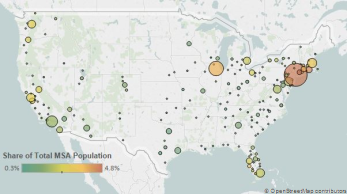There are many EU citizens who live outside the EU. A Migration Policy Institute article says four million EU citizens were living just in the USA in 2014. Millions more live in Canada, Singapore, Russia, Hong Kong, China, Australia, Brazil, Kazakhstan, India…

Distribution of Europeans living in the US
The European Commission and the British government are presently proposing to dramatically reduce the fee movement rights of those EU citizens who are married to non-EU citizens and who live outside the EU.
These EU citizens work, buy houses, get married (usually to non-Europeans, since most people around them are not European), have children: just normal daily life. Often they stay forever in their new home, and sometimes they decide to move back to Europe for any of a thousand good reasons.
Presently, European Free Movement law allows them to trivially move to any European country (apart from their natural home country of European citizenship). Their move, and that of their family, is hassle free, and they can easily do it even for short periods.
Some examples I personally know of people moving/working in Europe on the basis of EU free movement law:
- Swiss computer engineer with Vietnamese wife (married 6 years) and two children recently moved to work in the UK from Singapore
- French musician and US husband (married 21 years) live in Seattle and both perform together in UK folk music venues (mostly music clubs and pubs)
- British citizen professor lives in Canada with Canadian wife (married 11 years) and child do a sabbatical year in Paris
These examples can happen because the non-EU spouses is not required to satisfy restrictive local member state immigration laws. Since the spouse can come along easily, these EU citizens have been able to use their free movement rights.
What are the Commission and British government proposing?
The Commission intends to adopt a proposal to complement Directive 2004/38 on free movement of Union citizens in order to exclude, from the scope of free movement rights, third country nationals who had no prior lawful residence in a Member State before marrying a Union citizen
This is proposed in a Commission document addressing “abuse of the right of free movement of persons“, but the exclusion is not limited to cases where is abuse. It would apply to each of the example families mentioned above, because none of the spouses had ever resided in Europe before marrying their (EU-citizen) spouses.
As Steve Peers points out, the wording says that “lawful residence” must have happened before the start of the marriage. If it was not there when the couple married, there is nothing which can change the situation. Not 20 years of marriage, and not a subsequent period of lawful residence in Europe.
Is this really an attempt to tackle abuse? It seems to be simply a ploy to reduce the number of Europeans who can take advantage of their treaty right of free movement.
Why is this important?
It is generally hard to convince European citizens to take advantage of their free movement rights. They tend to prefer not to move away from their home country, and language is an issue.
Europeans who already live outside Europe have demonstrated that they are willing to live in a different country (and even continent!), to adapt, to work. They tend to be better educated, and bring valuable experience back to Europe if they return.
Why is the European Commission proposing to dramatically restrict the right of free movement of these Europeans? Why would member states agree to this being imposed on their citizens?
What to do?
Pause for a few minutes of amazement that the UK and the European Commission are even proposing this.
Reach out to the European Commission and tell them that this will have a disproportionate impact.
Most important is to reach out NOW to the embassies and foreign ministries of your European member state. If you are German, call the Auswärtigen Amts and your local embassy. Same if you are French, or Polish, or Hungarian. Let them know that you care, and want to maintain your right of free movement even if you have married a non-European.
Reach out to journalists you know and let them know about these proposed changes.
And reach out to your friends and family who might have an interest in this. Know a European citizen who lives outside the EU? This will affect them or their children!
Decisions are being made this week, and there will be little chance to influence the outcome after Thursday Feb 18..

 Guardian has a touching story of
Guardian has a touching story of